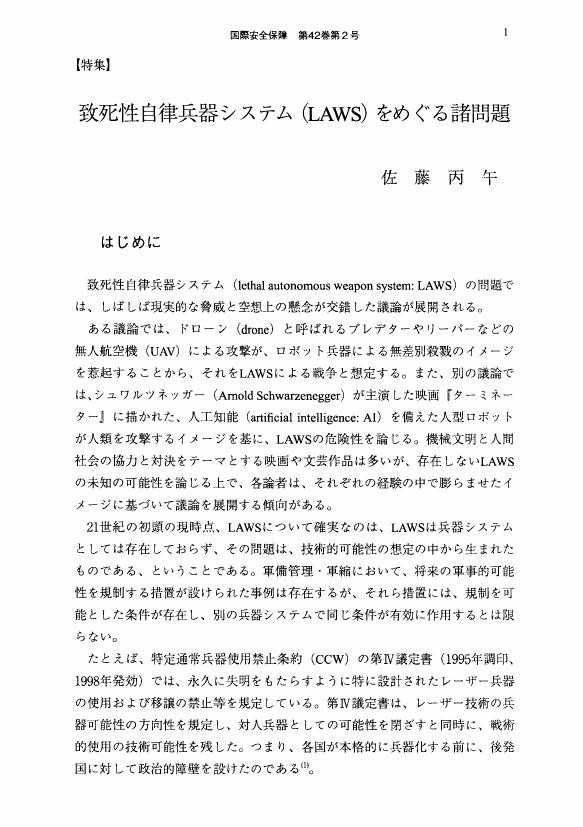- 著者
- 佐藤 丙午
- 出版者
- 一般財団法人 日本国際政治学会
- 雑誌
- 国際政治 (ISSN:04542215)
- 巻号頁・発行日
- vol.2022, no.205, pp.205_14-205_28, 2022-02-04 (Released:2022-03-31)
- 参考文献数
- 35
An economic statecraft is a policy measures utilizing an economic incentives and disincentives to force targeting county to comply with political demand of the sender. It is not a single definable policy measure but multiple measures to attain policy objectives through reflection of the degree and level of economic interaction among states.Economic statecraft is a policy measures by choice. Its political utilities are wide and politically manipulable since it is flexible in imposing and lifting the measures. It is often used to show senders political discontent without harming the formal political relations. It can also be utilized to execute political and tactical pressure by banning the export of the strategic goods and technologies thus deprive access to those items and control the degree of military development of the target. The UN has imposed various forms of economic sanctions under the UN Charter provisions.Despite the multiple utilities of these policy measures, a casual mechanism of the economic statecraft in changing the political decision of target is unknown. It may cause economic pain to the economy of the target and the mounting domestic pressure to concede to the demand of the sender could be a political driver. In opposite, it may harden the reaction of the target since it may unite the country to resist to the external pressure. As for the positive economic incentive, the domestic audience of the target may not induce by the reward given, thus may blur the mechanism of causal relationships.In many cases, economic statecraft is imposed without setting the specific goal or lifted without tangible result and fulfilling the concrete demand of the target. It is a symbolic policy tools to persuade domestic audience of the sender by showing that their government is executing tangible policy measures to exercise power on the target over contested political agenda. At the same token, a defensive economic measure, most notably export controls, may frame economic interaction corresponding to the strategic relationship. The aim of this measure is to shape the political relationship rather than punish or deter specific action.The assessment of utility of the economic statecraft differs when considering short term and long-term effect of the measures. Additionally, the economic statecraft has positive record when an instant reaction to the developing events is necessary to spare time for further consideration of policy appropriate.
1 0 0 0 OA 「武器輸出三原則等」から「防衛装備移転三原則」へ
- 著者
- 佐藤 丙午
- 出版者
- 国際安全保障学会
- 雑誌
- 国際安全保障 (ISSN:13467573)
- 巻号頁・発行日
- vol.49, no.4, pp.82-99, 2022-03-31 (Released:2023-11-28)
1 0 0 0 OA 致死性自律兵器システム(LAWS)をめぐる諸問題
- 著者
- 佐藤 丙午
- 出版者
- 国際安全保障学会
- 雑誌
- 国際安全保障 (ISSN:13467573)
- 巻号頁・発行日
- vol.42, no.2, pp.1-14, 2014-09-30 (Released:2022-04-07)
1 0 0 0 OA 森本 正崇 著『武器輸出三原則』
- 著者
- 佐藤 丙午
- 出版者
- 国際安全保障学会
- 雑誌
- 国際安全保障 (ISSN:13467573)
- 巻号頁・発行日
- vol.40, no.3, pp.107-111, 2012-12-31 (Released:2022-04-07)
1 0 0 0 OA 武器貿易条約(ATT)と軍備管理
- 著者
- 佐藤 丙午
- 出版者
- 国際安全保障学会
- 雑誌
- 国際安全保障 (ISSN:13467573)
- 巻号頁・発行日
- vol.37, no.4, pp.31-46, 2010-03-31 (Released:2022-04-14)
1 0 0 0 OA 安全保障と公共性 ―その変化と進展―
- 著者
- 佐藤 丙午
- 出版者
- 国際安全保障学会
- 雑誌
- 国際安全保障 (ISSN:13467573)
- 巻号頁・発行日
- vol.36, no.2, pp.1-24, 2008-09-30 (Released:2022-04-20)
1 0 0 0 OA 足立 研幾 著『オタワプロセス―対人地雷禁止レジームの形成』
- 著者
- 佐藤 丙午
- 出版者
- 国際安全保障学会
- 雑誌
- 国際安全保障 (ISSN:13467573)
- 巻号頁・発行日
- vol.33, no.4, pp.159-162, 2006-03-31 (Released:2022-04-24)
1 0 0 0 OA 米国の不拡散政策と輸出管理
- 著者
- 佐藤 丙午
- 出版者
- 国際安全保障学会
- 雑誌
- 国際安全保障 (ISSN:13467573)
- 巻号頁・発行日
- vol.32, no.2, pp.51-71, 2004-09-30 (Released:2022-04-24)
- 著者
- 佐藤 丙午
- 出版者
- 拓殖大学海外事情研究所
- 雑誌
- 海外事情 (ISSN:04530950)
- 巻号頁・発行日
- vol.63, no.3, pp.118-128, 2015-03
1 0 0 0 IR 中間選挙後の米国の外交・安全保障政策 (特集 岐路にたつオバマ政権)
- 著者
- 佐藤 丙午 サトウ ヘイゴ Heigo Sato
- 出版者
- 立教大学アメリカ研究所
- 雑誌
- 立教アメリカン・スタディーズ = Rikkyo American Studies (ISSN:13464825)
- 巻号頁・発行日
- no.37, pp.7-17, 2015-03






